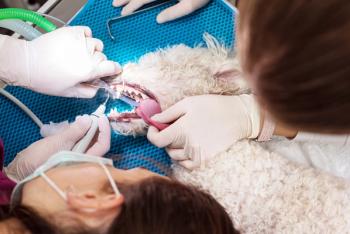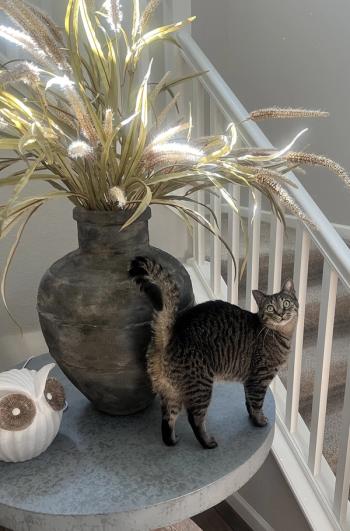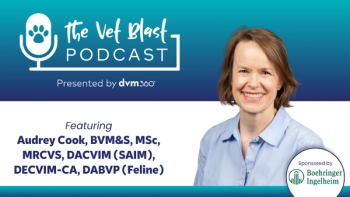
An Interview with Dr. William J. Kay
Having helped develop postgraduate programs at the Animal Medical Center, Dr. Kay urges veterinary students to take advantage of such educational opportunities as much as possible. "You will gain and grow in skill, confidence, and knowledge faster than at any other time in your career."
William J. Kay, DVM, DACVIM, is the former chief of staff of the Animal Medical Center in New York. He was named the Bustad Companion Animal Veterinarian of the Year in 1991 and is the author of several books on pet health.
Dr. Kay with Wellington, his 5-month-old Labrador retriever.
What is the most exciting change you've seen in veterinary medicine?
First, the increasing opportunities for veterinarians to gain postgraduate education as interns, residents, and graduate students. These opportunities have increased from about 10% in the mid-1960s to nearly 50% of recent U.S. and Canadian graduating classes today, including a shift from university and institution-based programs to private practice.
Second, the greater recognition of the profound interconnection between veterinary medicine and human medicine, called comparative medicine since the 1960s. Especially promising is the One Health Initiative that creates a new relationship between the AVMA and the American Medical Association.
Who was your most memorable patient?
My favorite cat, Mr. Yellow, a stray. I was unwilling to accept his dying, though tests confirmed irreversible kidney failure. Fortunately, Nancy O. Brown, VMD, DACVS, DACVIM, my wife and a practice owner, possessed the skill and humaneness to end his suffering.
Who inspired you most in your career?
Many veterinarians and others who supported and mentored me became dear friends throughout my 33 years at AMC, including the leaders of the board of trustees Joseph A. Poppi, Paul Cameron, and Philip Farley. I have also been fortunate to serve in close association and friendship for nearly 40 years with William F. Jackson, DVM, DACVS, DACVO, an AVMA past president and internationally known veterinarian and leader.
What was the best professional advice you ever received?
To get an AMC internship. AMC is a unique and dazzling institution that held for me and many others seemingly limitless possibilities. Beginning as an intern in 1966, I had the good fortune of serving with hundreds of the best, brightest, and most gifted and purposeful colleagues, who have made enduring and significant contributions to veterinary medicine.
What would you advise a new graduate?
Obtain the best post-veterinary-school education you can. You will gain and grow in skill, confidence, and knowledge faster than at any other time in your career.
What would you have liked to do if you hadn't become a veterinarian?
Become a career military officer or a military historian. I enjoyed leading a small unit during military service as an officer in the U.S. Army Veterinary Corps from 1964 to 1966, an opportunity that, although I surely lacked skill and experience, felt pretty good.
What book would you recommend?
Younger Next Year by Chris Crowley and Henry S. Lodge. It relays a powerful and simple message about why regular exercise, particularly after age 45, is the surest way to live a long and healthy life. The authors also urge us to quit eating garbage and to connect and commit to people and causes.
What favorite musicians or songs would you include on your personal jukebox?
Willie Nelson, Johnny Cash, Elvis Presley, and music from The Phantom of the Opera.
What do you consider the greatest threat to the profession?
One threat is veterinary colleges without veterinary teaching hospitals. This unprecedented, untested, and unproven model assumes that private practices and other entities can teach equally to the veterinary teaching hospitals and, thus, are their equivalent. Sending all or most of a clinical curriculum off-site, although far less costly, limits the clinical competency of graduates, no matter how sophisticated and well-run the programs are.
A second threat is corporate ownership and control of veterinary colleges. Excellent veterinary medical education and profits are, in my judgment, incompatible strategic goals. Profits will be optimized at the expense of education. The profession's leading organizations and institutions must be prepared to debate this most serious matter.
Another threat is substituting accreditation for programs that make strategic sense internationally. Accreditation of foreign veterinary colleges must be limited to only those that are essentially equal with the outstanding schools and colleges of veterinary medicine in the United States and Canada.
Which animal health needs are currently unmet?
Creating and educating a critical mass of veterinarians to respond to national and international widespread disease threats and outbreaks, including natural and man-made disasters. The veterinary profession has made real progress, but our profession lacks the infrastructure to meet the challenges.
What is the greatest achievement of your career?
Helping to manage and lead the AMC to become a true postgraduate veterinary teaching hospital and medical center. Nearly 1,000 interns and residents have gained skills, knowledge, and confidence in the center's programs. Its continuing education programs for practicing veterinarians and veterinary technicians included the unique Intensive Post-Graduate Program, primarily for foreign veterinary college graduates. I believe this experience helped many of these bright and committed veterinarians.
What makes a good veterinarian?
Hard work, equal concern for people and animals, and an appreciation that as veterinarians we are privileged to do what we do.
Is there a veterinary leader you'd like us to interview?
If so, please e-mail or fax us the person's name and affiliation:
Newsletter
From exam room tips to practice management insights, get trusted veterinary news delivered straight to your inbox—subscribe to dvm360.




